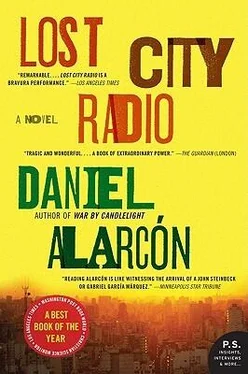“Don’t cry,” he said.
“He has nightmares. They’re worse this year since Nico left.”
Manau pulled her to him. In a week, she would be dead. “Does he remember?”
“Of course he does. Nico never let him forget it.”
The storm began, a music all its own. They were silent for a spell.
“I gave him tea so he could sleep.” Her voice was a whimper. “Poor boy, poor Zahir, poor Nico.”
“Don’t cry,” he said again.
They waited for the rains to begin. Manau lay his mat down. She said no, that she should go back and check on her boy. He kissed her. She kissed him back. In the distance, there was more lightning. Then they were naked, and then they were being rained on. The sky heaved, and the wind blew. “I have to check on my boy,” she whispered, but her body did not complain. Instead, she moved beneath him, with him, the rain falling faster now, until they had both arrived at the same place.
“I’M STEPPING out for some air,” Manau said, and surely he meant it. Surely he did not mean to walk away and leave the boy there at the station, waiting for Norma alone. He might have suspected himself capable of such a thing, if he believed what his father had always said about him. But he didn’t — not until that day. He was a weak man, which is different from being a bad man. Manau would walk home from the station, walk through this gray and noisy city, and console himself with this distinction. He’d managed to hide this from himself for a short time in the jungle. Now it was clear. Why had Adela counted on him? Why had the town?
When they were finished, when the rains had passed, Manau rolled up his mat, and invited her to swim.
“I don’t know how,” she said.
The clouds had cleared; the stars cut a bright swath across the night sky. They could see each other. She dressed, she covered her silver body. Manau remained naked. He carried his clothes in a bundle.
“I’ll teach you.”
“But it’s bad luck to swim on a moonless night.”
It was what she said as he dragged her in. “Superstition!” he exclaimed, and soon after she was laughing and must have forgotten it herself. He tickled her. The water was black and slick and calm. When the wind blew, raindrops fell from the trees, disturbing the surface of the slow-moving river. It would rain every night for the next week, and each night would be darker than the last. The river, when it took her, would be something altogether different. Unrecognizable. Violent.
She splashed; a bird chirruped. The silver fish swam invisibly about their ankles. Manau did not teach her anything that night. Nothing about swimming or the currents or the rain-swollen river.
“What’s this?” Victor asked, looking up from his list.
“The money the man gave me for you. On the bus. So I don’t forget.”
“Where are you going?”
Manau said, “I’ll be right here. I’m stepping out for some air.”
The boy nodded. It wasn’t a lie. Outside was the city with its leaden sky, and the street with its waves of sound. The boy didn’t protest, nor did the receptionist with her lipstick-stained teeth.
Outside Manau breathed deeply, that city smell, and he was hit by a nostalgia that surprised him. The station sat on a busy boulevard of ashy green trees. Perhaps he’d been here before, perhaps not, but it was all familiar. Across the street, a computer school had let out its morning classes. Dozens of students loitered in front of the entrance, gossiping, making plans. They had about them that optimism all young people have. Foolishness. A bus came and went, depositing a family of Indians at the corner, and the students paid them no attention. Mother and father looked about with dismay, at the size of the place, at the crowded sidewalk. Perhaps they were coming to the station as well, to see Norma, to be found. The children cowered and disappeared into the folds of their mother’s dress.
Four lanes of traffic and a row of dying trees stood between them and the station. They didn’t cross, and Manau didn’t cross to them. Maybe they were waiting for someone. The crowd of students thinned. Some returned to class, a few waited impatiently for a bus, others set off in loud, happy packs down the avenue. It occurred to Manau that there were more people in the building of the computer school than in the entire village of 1797.
After some debate, the family of Indians trudged off down the boulevard. They clasped hands and walked slowly.
When he looked back through the window of the radio station lobby, Victor was gone. Manau ran in. “The boy,” he said to the receptionist. He was breathless. It was no longer Norma’s voice over the speaker, but someone else’s. “Where’s the boy?”
The receptionist looked startled for a moment, then regained her calm. “They called him in, sir. I’m sorry. The producer came to get him. He’s talking with Norma.” She paused. “Are you all right? Would you like to go?”
It hit him then, a live-wire shock. That last word. “Go?”
“Go in,” she clarified.
“Oh.” He felt numb. A smile adorned the receptionist’s moon face. “No. That’s all right. I’ll wait outside.”
She nodded. He took the bag he’d left by the couch and stepped through the doors again. The street was indifferent and loud. Buses passed, and women on bicycles, and boys on skateboards. He recalled the size of the city, and it awed him. The possibility existed that someone here might be happy to see him. The jungle town he had known would soon sink into the forest. Where was the boy? He was speaking with Norma. Even now, she was solving his problems. Whatever she can do, he thought, is more than I can. He still heard the voices — Manau, Manau, Manau — and they came from everywhere. From cracks in the bricks that had built this place.
He realized suddenly he’d been holding his breath. He inhaled deeply. Then he walked down the avenue. It was so simple. A block passed by as if in a dream. And then another and another.
Each was easier than the last.
When they were done swimming, they gathered their things and walked back to the village. Their wet clothes clung to them, but the night was cool and dry. Everything was fine. He recalled it now as he walked through the city, how recently his world had been dismantled. The storm passed that night, but of course another was on its way. They found Adela’s hut, and she lit a lantern so she could check on the boy. A forest of insects was sawing away at the night.
“Will you take care of him?” she asked. “If something happens to me.”
“Nothing’s going to happen to you.”
“But if it does.” She was serious. She whispered in his ear, “Say yes,” and Manau did as he was told.
FOR NORMA, the war began fourteen years earlier, the day she was sent to cover a fire in Tamoé. She was just a copy editor at the radio station then, and had never been on the air, her voice an undiscovered treasure. She and Rey had been married for more than two years, but she still thought of herself as a newlywed. He was due to return from the jungle that afternoon. It was October, nearing the sixth anniversary of the beginning of the war, though no one kept time that way in those days.
Norma arrived on the scene to find the firemen watching as the house burned. A few men with guns and masks stood in front of the fire. A polite crowd had gathered around the house, arms crossed, blinking away the acrid smoke. Norma could still make out the word TRAITOR painted in black on the burning wall. The terrorists didn’t move or make threats — they didn’t have to. The firemen were volunteers. They wouldn’t take a bullet for a fire. It was late afternoon at the edge of the city, and soon it would be dark. There were no streetlights in this part of the district. Norma’s eyes stung. The firemen had given up. One of them sat on his hard plastic helmet, smoking a cigarette. “Are you going to do anything?” Norma asked.
Читать дальше












